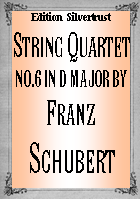Presents
Franz Schubert
 |
|
String Quartet No.6 in D Major, D.74
Franz Schubert (1797-1828), one of the most famous composers of all time, requires no introduction. However, his first six string quartets are virtually unknown and rarely heard let alone played. To learn more about their background and why that is Click Here.
Immediately after completing the Fifth Quartet, Schubert began work on another which he completed toward the end of September of 1813. On the title page to String Quartet No.6 in D Major, D.74, which was rediscovered in 1928, the following dedication in Schubert’s hand was written: “Trois Quatuors pour deux Violons, Viole et Violoncelle composés par François Schubert écolier de Msr. De Salieri.” Although Schubert left the Stadt Konvikt in June of 1813, he continued lessons on a private basis with Salieri until 1817. We also know that this is one of the works which Salieri must have examined because after his name on the title page, Salieri added, in his own handwriting, the words “premier Maître de chapelle de la cour imp et Royale de Vienne.” Was this then the first of a set of three, the last two of which are lost? Otto Deutsch, Schubert’s cataloguer thinks so. But the English Schubert scholar Maurice Brown believes that Quartet Nos. 8 and 10 (D.112 & D.87) are the last two. The opening Allegro ma non troppo, is written on a huge scale but and clothed with some very charming themes. The second subject is just as lovely as the first. There are several episodes where Schubert achieves the kind of orchestral tonal effect he obtained in the Fifth Quartet. The following Andante is both poignant and somewhat introspective. The Minuetto, Allegro is extraordinarily fine. It might serve as the perfect example of a tasteful classical Viennese minuet. The main theme, though restrained, is quite lyrical because of the chromaticism. The lovely trio is a fetching country ländler. The delicate melody has a sweet reticence about it, rather like a young girl being introduced at her first dance. It is not very far to go from music like this to the early efforts of Lanner and the elder Strauss. The finale, an energetic Allegro, brings the quartet to a satisfactory conclusion.
Here again is a quartet which could be substituted in place of a Haydn or Mozart by a group looking for something fresh. Amateurs will also enjoy playing this quartet. You may also wish to consier our offer of Quartet Nos. 4-6 as a book at a special price.
| (A) String Quartet No.6-Parts | $24.95 |
|
|
(B) String Quartet No.6-Parts & Score |
$31.95 |
|
| (C) String Quartet Nos.4-6-Parts | $64.95 |
|
| (C) String Quartet Nos.4-6-Parts & Score | $84.95 |
|